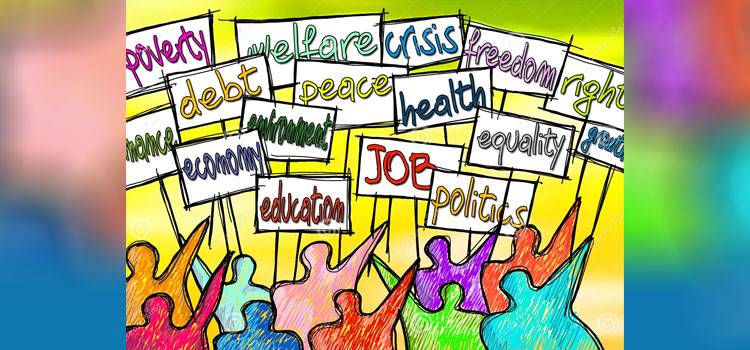
The list of miseries in life in a country that is continuously scoring dismal rankings on human development, gender inequality, and rule of law indices is long. But, for me, the demand for dowry and lavish weddings top the list, followed closely by unwanted pregnancies and a preference for sons over girls.
Ironically, both these issues are preventable.
In an age of media influx and fast revolutions, eliminating dowry, extravagant weddings and unwanted pregnancies from our systems is easily possible. What is stopping people from opting for simple weddings? What is stopping young consumers of social media from gaining information about sexual and reproductive health rights? What is stopping educated men from stopping verbal, financial, emotional, and physical abuse towards their wives for not giving birth to a son? Though such issues are driven by culture, health and wellbeing remains an individual responsibility.
In the earlier part of my career, I thought behaviour could be changed through better communication and laws. After investing many years in researching the media, legislators and other stakeholders, I feel the two could do wonders. But ground reality is otherwise. Too little is done on merit.
Most parliamentarians have no appetite for tough anti-dowry laws or resource allocation to ensure universal health coverage and age-appropriate health and reproductive health education. A larger part of the budget is spent on trips and travels of bureaucrats and legislators. A huge percentage of young people remain jobless. Hiring with a lucrative package in the non-public sector organisations has layers of nepotism and requires networking. All this is nearly impossible to prove with evidence, but evidence of absence is not the absence of any misdoing.
Millions of our people face mental health issues. They become invisible victims and unable to break free from harmful cultural practices. Women suffer all the more in silence.
Different governments in Pakistan, in the pre- and post-18th amendment periods, have effectively failed to pay due attention to these issues. Their partners in failure also include UN agencies and many other technical aid and donor agencies. There is no magic wand to create transformative changes. The path to the empowerment of women and all disadvantaged individuals, and the attainment of health, including financial, mental, and reproductive health, requires embracing equity and diversity.
This process is painful. Dismantling elite capture and corporate interests need to be identified as preconditions for visible social development in Pakistan and attaining the targets of the SDGs of the UN Agenda 2030.
Even after spending nearly three decades in the social development industry and experiencing diverse but matching experiences regarding the politics of nonprofits, ineffectiveness of aid, unstable and unpredictable political commitments, and marginalisation of civic will, I remain an awakened dreamer. The title though can easily be confused with an idealist, a failed activist or a fool.
Ironically, both these issues are preventable.
In an age of media influx and fast revolutions, eliminating dowry, extravagant weddings and unwanted pregnancies from our systems is easily possible. What is stopping people from opting for simple weddings? What is stopping young consumers of social media from gaining information about sexual and reproductive health rights? What is stopping educated men from stopping verbal, financial, emotional, and physical abuse towards their wives for not giving birth to a son? Though such issues are driven by culture, health and wellbeing remains an individual responsibility.
In the earlier part of my career, I thought behaviour could be changed through better communication and laws. After investing many years in researching the media, legislators and other stakeholders, I feel the two could do wonders. But ground reality is otherwise. Too little is done on merit.
Most parliamentarians have no appetite for tough anti-dowry laws or resource allocation to ensure universal health coverage and age-appropriate health and reproductive health education. A larger part of the budget is spent on trips and travels of bureaucrats and legislators. A huge percentage of young people remain jobless. Hiring with a lucrative package in the non-public sector organisations has layers of nepotism and requires networking. All this is nearly impossible to prove with evidence, but evidence of absence is not the absence of any misdoing.
Millions of our people face mental health issues. They become invisible victims and unable to break free from harmful cultural practices. Women suffer all the more in silence.
Different governments in Pakistan, in the pre- and post-18th amendment periods, have effectively failed to pay due attention to these issues. Their partners in failure also include UN agencies and many other technical aid and donor agencies. There is no magic wand to create transformative changes. The path to the empowerment of women and all disadvantaged individuals, and the attainment of health, including financial, mental, and reproductive health, requires embracing equity and diversity.
This process is painful. Dismantling elite capture and corporate interests need to be identified as preconditions for visible social development in Pakistan and attaining the targets of the SDGs of the UN Agenda 2030.
Even after spending nearly three decades in the social development industry and experiencing diverse but matching experiences regarding the politics of nonprofits, ineffectiveness of aid, unstable and unpredictable political commitments, and marginalisation of civic will, I remain an awakened dreamer. The title though can easily be confused with an idealist, a failed activist or a fool.

